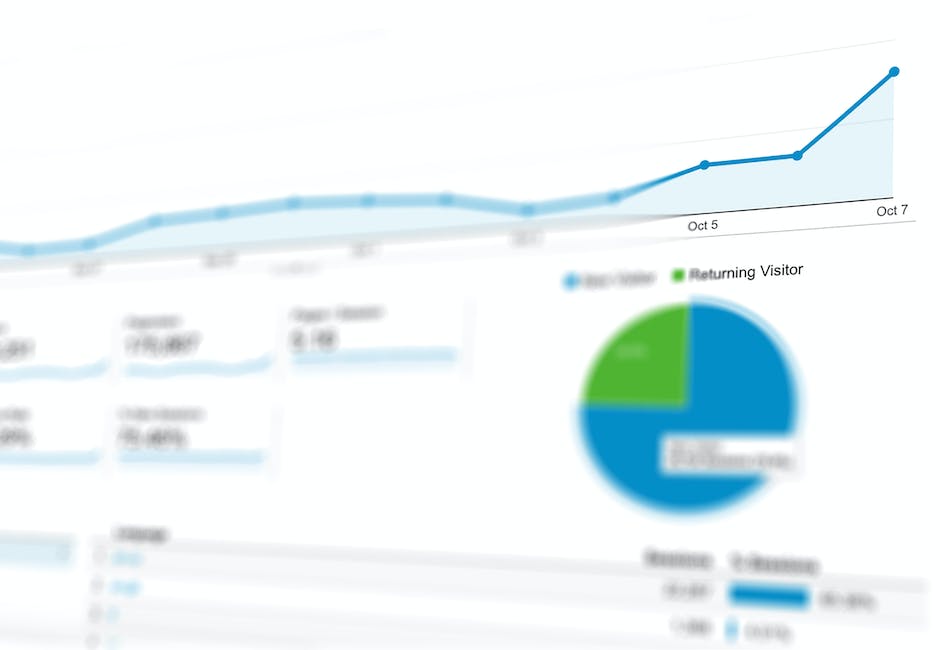In today’s digital age, having a website for your business is no longer enough to drive traffic, increase conversions, and boost your online visibility. Search Engine Optimization (SEO) is an essential component of digital marketing that helps businesses improve their rankings on search engine results pages (SERPs). However, to get the most out of your SEO strategy, you need to monitor your website’s performance with the right tool.
Enter Google Analytics, a free web analytics service from Google that allows you to track and analyze your website’s traffic, user behavior, and other key metrics. By integrating Google Analytics into your SEO strategy, you can gain valuable insights into how users find and interact with your website and use this information to optimize your site’s performance.
In this blog post, we’ll explore how you can use Google Analytics to improve your SEO and drive more traffic to your website. We’ll cover everything from understanding Google Analytics metrics for SEO success, analyzing your website’s traffic sources, optimizing your keyword strategy, utilizing Google Analytics for content creation, enhancing your website’s user experience, and measuring the results of your SEO efforts.
Whether you’re a beginner or an experienced digital marketer, this guide will provide you with the tools and strategies to maximize your SEO impact and achieve your business goals. So, let’s dive in!
Analyzing Your Website’s Traffic Sources with Google Analytics
Google Analytics is a powerful tool that gives website owners valuable data about their traffic sources. Tracking and analyzing your website’s traffic sources is essential for making data-driven decisions to improve your SEO strategy.
When you analyze your website’s traffic sources, you get insight into where your visitors are coming from and how they interact with your website. You can identify which sources are driving the most traffic, which pages are the most popular, and which pages are underperforming.
One way to analyze your website’s traffic sources is to look at the referral sources report in Google Analytics. This report shows you the websites that are linking to your site and driving traffic to it. You can use this information to find out which websites are linking to you the most and which pages are getting the most traffic.
You can also use the search engine optimization report in Google Analytics to analyze your website’s organic traffic. This report shows you the keywords that users are searching for to find your website. You can see which keywords are driving the most traffic and which pages are ranking the highest for those keywords.
The social media report in Google Analytics is another valuable tool for analyzing your website’s traffic sources. This report shows you which social media platforms are driving the most traffic to your site. You can use this information to determine which social media platforms to focus on and which types of content are most effective on each platform.
Additionally, the direct traffic report in Google Analytics can show you how many visitors are typing in your website’s URL directly into their browser. This can be an indicator of how well-known your brand is. You can also use this report to identify pages on your site that are being accessed directly.
By analyzing your website’s traffic sources with Google Analytics, you can gain a better understanding of your audience and how they interact with your website. This information can help you make data-driven decisions to improve your SEO strategy and drive more traffic to your site.
Understanding Google Analytics Metrics for SEO Success
Google Analytics is an invaluable tool for understanding how your website is performing in terms of visitor engagement, traffic sources, and overall performance. One of the most important uses of Google Analytics is to measure the success of your Search Engine Optimization (SEO) efforts. In order to improve your SEO, it is essential to understand and track a number of key metrics in Google Analytics.
The first metric to understand is your website’s organic search traffic. This metric measures the number of visitors who found your website through a search engine such as Google. Organic search traffic is important because it indicates the success of your SEO efforts. By tracking this metric over time, you can see whether your SEO strategies are improving your search engine rankings and attracting more visitors to your site.
Another important metric to track is your website’s bounce rate. Bounce rate measures the percentage of visitors who leave your site after viewing only one page. A high bounce rate can indicate a number of issues with your website, including poor user experience or irrelevant content.
On the other hand, a low bounce rate can indicate that your website is engaging visitors and providing valuable content. By analyzing your website’s bounce rate in Google Analytics, you can identify areas for improvement and develop strategies to keep visitors on your site longer.
Conversion rate is another crucial metric to track in Google Analytics. Conversion rate measures the percentage of visitors who take a desired action on your website, such as making a purchase or filling out a contact form. By understanding your website’s conversion rate, you can identify areas for improvement and develop strategies to increase conversions.
When it comes to SEO, it is also important to track your website’s search engine rankings. Google Analytics provides data on the keywords that are driving traffic to your site and the search engines that are referring traffic. By tracking changes in search engine rankings over time, you can see the effects of your SEO efforts and adjust your strategies accordingly.
Finally, it is essential to pay attention to the overall traffic to your website. By tracking how many visitors are coming to your site, where they are coming from, and how long they are staying, you can identify areas for improvement and refine your SEO strategies to attract more visitors to your site.
Overall, understanding the key metrics in Google Analytics is essential for improving your website’s SEO. By tracking these metrics, you can measure the success of your SEO strategies and identify areas for improvement, ultimately leading to increased traffic and improved engagement on your website.
Optimizing Your Keyword Strategy with Google Analytics
One of the most crucial steps in any successful SEO campaign is selecting the right keywords to target. Google Analytics can be a valuable tool to help you refine and optimize your keyword strategy. By analyzing your website’s data, you can gain a better understanding of which keywords are driving traffic to your site and how those keywords are performing.
The first step in optimizing your keyword strategy with Google Analytics is to identify which keywords are currently driving the most traffic to your site. This information can be found in the Acquisition section, under the Search Engine Optimization tab. From here, you can view which keywords are bringing in the most traffic and which pages on your site are receiving the most visits.
Once you’ve identified your top-performing keywords, it’s time to analyze their performance in more detail. Use the Keyword Analysis report to identify which pages are ranking for your target keywords and how those pages are performing in terms of bounce rate, time on site, and conversion rate. This information can help you identify opportunities to improve the content and user experience on those pages.
Another way to optimize your keyword strategy is to explore long-tail keywords. These are highly specific, less popular keywords that can be easier to rank for and can drive targeted traffic to your site. Use the Keyword Ideas report in Google Analytics to identify potential long-tail keywords related to your primary keywords.
Once you’ve identified your target long-tail keywords, be sure to incorporate them into your content strategy. Create targeted blog posts and landing pages around these keywords to attract traffic and improve your search engine rankings.
Overall, Google Analytics provides valuable insights into how your keywords are performing and can help you optimize your SEO strategy. By regularly analyzing your website’s traffic sources and keyword performance, you can continually refine and improve your keyword strategy for maximum results.
Enhancing Your Websites User Experience with Google Analytics
Google Analytics is an incredibly powerful tool that can help you not only understand your website visitors’ behavior but also their preferences and needs. By analyzing user data, you can make informed decisions to enhance your website’s user experience. In this section, we’ll discuss how you can use Google Analytics to improve your website’s user experience.
The first step is to analyze your website’s bounce rate. A high bounce rate indicates that users are not finding what they’re looking for on your website. To decrease your bounce rate, you can use Google Analytics to identify the top exit pages and improve the content on those pages. Additionally, you can analyze what content or pages have the highest bounce rate and make changes to improve them to keep visitors engaged.
Another way to enhance user experience is to optimize the website for mobile devices. Google Analytics provides information regarding audience devices. If you see most of your traffic coming from mobile devices, you need to check whether the website and its elements work well on mobile devices. Ensure the website is responsive or uses a website layout or theme optimized for mobile devices.
The next step is to analyze how visitors interact with your website and whether they are able to complete their desired actions or not. Google Analytics provides an option to set up conversion goals, such as filling up a form, making a purchase, or subscribing to a newsletter. Monitoring and tracking goals in Google Analytics can help you to determine the effectiveness of your content in achieving the goals, leading to a better user experience.
Improving the website loading speed is another crucial factor in enhancing user experience. A slow loading website can cause visitors to lose interest and move on to a competitor’s website. Google Analytics provides a speed report, showing the average load time for your website. If the load time is longer than three seconds, optimization is necessary.
The last step is to analyze your website’s site search report. A site search report will show you which keywords visitors are searching for on your website. By analyzing the keywords, you can create or improve your web pages, ensuring that users find the information they need faster and more efficiently. It will increase engagement and dwell time on your website.
Conclusion
Google Analytics can be an invaluable tool for improving your website’s SEO. By analyzing metrics such as traffic sources and user behavior, you can gain insights into how your site is performing and make optimizations accordingly.
When it comes to optimizing your keyword strategy, Google Analytics can help you identify which keywords are driving the most traffic to your site and which ones may need further optimization. Additionally, you can use Analytics to determine which types of content are resonating with your audience and make informed decisions about your content strategy.
By using Google Analytics to enhance your website’s user experience, you can gain a deeper understanding of how users are engaging with your site and identify areas for improvement. This can include optimizing page load times, improving navigation, and creating more engaging and effective content.
Measuring the results of your SEO efforts is also crucial to ensuring your website continues to improve over time. With Google Analytics, you can track the success of your optimization efforts and make data-driven decisions about future strategies.
In conclusion, Google Analytics is a powerful tool for improving your website’s SEO. By leveraging its metrics and insights, you can optimize your keyword strategy, create more engaging content, improve user experience, and measure the success of your SEO efforts. Incorporating Google Analytics into your SEO strategy is a must for anyone looking to increase their website’s visibility and drive more traffic to their online business.




